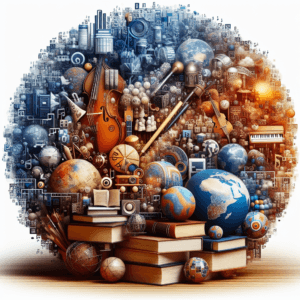Humanities encompass a broad field of study that focuses on the various aspects of human culture, thought, and experience. This discipline includes areas such as literature, philosophy, history, art, music, linguistics, and cultural studies, all of which contribute in unique ways to our understanding of what it means to be human.
The Role of Humanities in Society
Humanities play a critical role in shaping our societies and enriching our lives. They allow individuals to reflect on moral values, beliefs, and the complexities of human existence. Through literature, for instance, readers can engage with characters and narratives that reflect diverse perspectives and life experiences. This engagement fosters empathy, helping individuals understand situations and feelings beyond their own immediate reality.
Philosophy provides a framework for examining fundamental questions about life, ethics, and human behavior. By pondering concepts such as justice, freedom, and identity, individuals can cultivate a deeper understanding of their own beliefs and the societal norms that influence their decisions.
Historical Context
History is an indispensable component of the humanities. It allows societies to remember events, culture, and lessons from the past, informing collective identity and future decisions. Studying history involves analyzing primary and secondary sources, which requires critical thinking and interpretive skills. This academic pursuit encourages individuals to consider how historical events shape contemporary issues and relationships.
The Arts as a Reflection of Humanity
The arts, including visual arts, music, and performance, serve as a form of expression that transcends language and cultural differences. Art has the power to communicate emotions, provoke thought, and challenge societal norms. The value of artistic works is not merely in their aesthetic qualities but in their ability to comment on societal issues, provoke dialogue, and inspire action.
Art movements often emerge as reflections of historical events and cultural shifts. For example, the Harlem Renaissance celebrated African American culture and artistic expression, challenging racial stereotypes and advocating for civil rights. Such movements demonstrate how the arts contribute to social progress and collective consciousness.
The Importance of Language
Linguistics, a subfield of humanities, focuses on the structure, use, and evolution of language. Language is more than a means of communication; it is a key element of cultural identity. The study of languages helps individuals appreciate the diversity of human expression and how language shapes our understanding of the world.
Furthermore, language plays a pivotal role in transmitting knowledge, traditions, and values from one generation to the next. By studying ancient texts and modern dialects alike, scholars can track changes in thought and culture over time, highlighting the dynamic nature of human communication.
Humanities in the Modern World
In today’s rapidly changing world, the insights gained from humanities are more relevant than ever. Globalization, technological advancements, and societal challenges require individuals to think critically and creatively. The humanities foster skills that are essential in addressing complex issues, promoting cross-cultural understanding, and encouraging active citizenship.
Education in the humanities equips individuals to analyze and articulate nuanced perspectives. This proficiency is vital in various careers, from education to policy-making, providing a strong foundation for informed leadership and civic engagement.
Conclusion
Humanities serve as a vital lens through which we understand ourselves and the world around us. By studying human culture, thought, and history, we gain insights that resonate on both personal and societal levels. In a world marked by diversity and change, the humanities encourage critical reflection, foster empathy, and promote a deeper appreciation for the human experience. Ultimately, engaging with the humanities enriches our lives and strengthens the social fabric of our communities.







